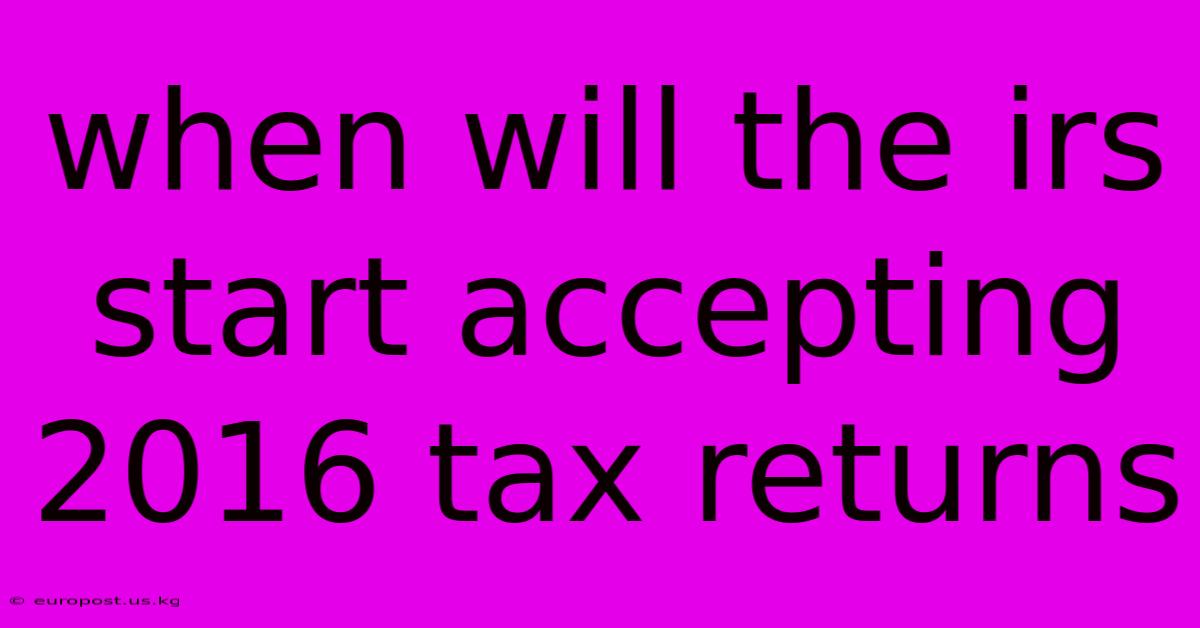When Will The Irs Start Accepting 2016 Tax Returns

Discover more in-depth information on our site. Click the link below to dive deeper: Visit the Best Website meltwatermedia.ca. Make sure you don’t miss it!
Table of Contents
The IRS no longer accepts 2016 tax returns. The deadline for filing 2016 tax returns was long ago. This article will address the general process of tax filing, common questions surrounding past tax returns, and what to do if you haven't filed a past tax return. It will also cover resources to help you understand current tax years' deadlines and filing procedures.
Understanding the IRS Tax Filing Process
The Internal Revenue Service (IRS) follows a yearly cycle for tax filings. Each year has a specific tax season, during which individuals and businesses file their tax returns for the previous year's income. This is crucial because the tax year runs from January 1st to December 31st, while the tax filing period typically starts in late January/early February and ends in mid-April.
The IRS announces the exact dates well in advance, typically several months before the start of the tax season. These dates are widely publicized through official IRS channels, the news media, and tax preparation software companies. Missing the deadline has consequences, including penalties and interest charges.
Why You Should File Your Taxes On Time
Filing taxes on time is essential for several reasons:
- Avoid Penalties and Interest: The IRS imposes penalties and interest on late filings. These charges can significantly add to your tax bill.
- Receive Your Refund (if applicable): If you’re expecting a tax refund, filing on time ensures you receive it promptly.
- Maintain Compliance: Timely filing demonstrates your compliance with tax laws.
- Avoid Audit Risks: While not a guarantee, timely filing can reduce the risk of an IRS audit.
What to Do if You Haven't Filed a Past Tax Return
If you haven't filed a tax return for a past year, such as 2016, it's crucial to act promptly. The longer you wait, the more significant the penalties and interest will become. Here's what you should do:
-
Gather Your Tax Documents: Collect all relevant tax documents, such as W-2s, 1099s, and other income statements, along with any deductions or credits you're eligible for. This will be challenging for 2016, as many documents may be misplaced or difficult to obtain from employers or other sources.
-
Prepare Your Tax Return: You can prepare your return yourself using tax software or by consulting a tax professional. A tax professional can help you navigate the complexities of past filings and ensure you're claiming all applicable deductions and credits.
-
File Your Return: File your return electronically or by mail. Electronic filing is generally faster and more efficient. While you cannot file a 2016 return electronically through the IRS's systems anymore, you may have to file a paper return. Be prepared for potential delays due to the age of the return.
-
Pay Any Taxes Owed: If you owe taxes, pay them along with your return. You can make payments online, by mail, or by phone. If you are unable to pay in full, consider exploring options like an IRS payment plan.
-
Contact the IRS: If you're facing significant challenges in filing your past tax return, contact the IRS directly. Explain your situation and seek assistance.
Important Resources and Information
- IRS.gov: The official IRS website is your primary source of information on tax deadlines, filing procedures, and forms.
- Tax Professionals: Certified Public Accountants (CPAs) and Enrolled Agents (EAs) can provide valuable assistance with your tax preparation and filing.
- Tax Preparation Software: Several reputable tax software programs can guide you through the process. However, for past years' returns, you may need to consult a tax professional for assistance.
Addressing the Specific Question: When Did the IRS Accept 2016 Tax Returns?
The IRS's acceptance of 2016 tax returns ended long ago. The original filing deadline passed several years ago, and the IRS no longer maintains active processing systems for that tax year. Any attempts to file a 2016 return through electronic means will be unsuccessful. If you need to file a 2016 return, you will likely need to file a paper return.
Important Considerations for Late Filings:
- Penalties: Be prepared for substantial penalties and interest for the significantly late filing.
- Statute of Limitations: The IRS has a limited time to assess taxes. This is typically three years after the filing deadline (or two years if you underpaid). While this can offer some relief, it's crucial to file the return to establish your tax liability and avoid further complications. If significant fraud or evasion is involved, the statute of limitations extends to longer periods.
This article covers a general overview of tax filing. The specific information for a 2016 return may have changed or be outdated. Always consult the official IRS website or a tax professional for the most current and accurate information. Due to the significant time elapsed since the 2016 tax year, professional help is highly recommended to navigate the complexities of a significantly late filing.

Thank you for taking the time to explore our website When Will The Irs Start Accepting 2016 Tax Returns. We hope you find the information useful. Feel free to contact us for any questions, and don’t forget to bookmark us for future visits!
We truly appreciate your visit to explore more about When Will The Irs Start Accepting 2016 Tax Returns. Let us know if you need further assistance. Be sure to bookmark this site and visit us again soon!
Featured Posts
-
How Do You Sign A Tax Return For A Deceased Person
Jan 12, 2025
-
How To Read An Irs Transcript
Jan 12, 2025
-
Constant Maturity Swap Cms Definition And Examples
Jan 12, 2025
-
What Is Irs Form 944
Jan 12, 2025
-
How To Close Out 401k While Still Employed
Jan 12, 2025
